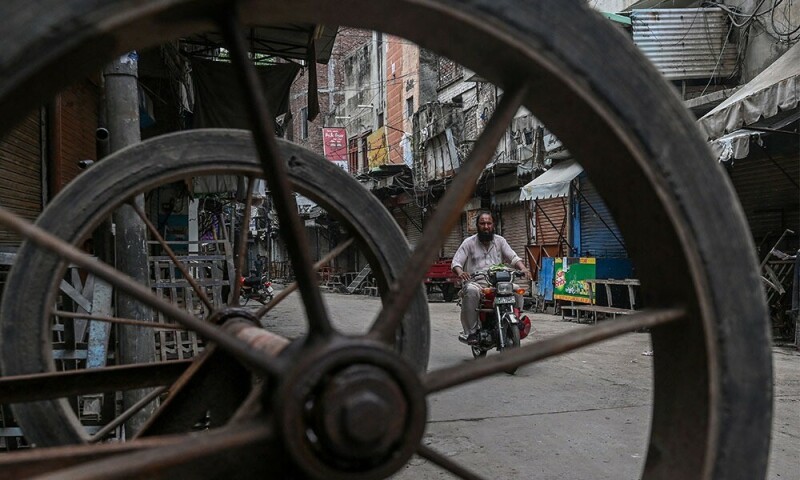Pakistan’s two largest cities – Karachi and Lahore – faced partial and complete market closures on Saturday over a strike call by traders against what they called “anti-business” tax measures introduced in the Finance Act 2025.
In the Finance Act, the government expanded the Federal Board of Revenue (FBR) powers with Sections 37A and 37B, which empower FBR officials with arbitrary arrests; Section 21(S), which imposes harsh penalties on cash transactions of Rs200,000 or more; mandatory digital invoicing under SRO 709; and the imposition of e-Bilty under Section 40(C).
July 19 strike call: govt invites trade leaders for talks
The business community termed these measures “anti-business” and announced a nationwide strike on July 19 (today). They also called for the restoration of the Final Tax Regime for exporters.
However, the business community later appeared divided, with the Federation of Pakistan Chambers of Commerce and Industry (FPCCI) postponing the protest following talks with the government, while the Karachi Chamber of Commerce and Industry (KCCI) vowing to go ahead with the strike.
It is for the first time that a complete strike has been witnessed in Karachi’s New Sabzi Mandi.
The KCCI spearheaded the strike on Saturday, backed by the Lahore Chamber of Commerce & Industry (LCCI), Hyderabad Chamber of Small Traders & Small Industry (HCSTSI), and others. Meanwhile, Pakistan’s capital Islamabad reportedly remained largely affected.
United Goods Transport Alliance Patron in Chief Malik Shabbar Khan told Business Recorder that two big transport alliances in the country, including United Goods Transport Alliance and Pakistan Goods Transport Alliance, had supported the KCCI.
“Today we have stopped all bookings, but goods transport takes five days to come to a halt,” Khan said.
“What’s more, we will be affected by this black law. Let me give you an example, when a goods truck goes to Karachi from Peshawar and comes back, it has to pay around Rs100,000 in terms of tolls and various challans. We talked to the KCCI leaders that if the demands are not fulfilled, we can go on strike once or twice a week. It will be decided later after meeting with the business community.”
Veteran fruits merchant Haji Mehboob Shair said, “It is for the first time in the history of the country that the complete strike has been witnessed in Sabzi Mandi”.
According to Shair, a large number of trucks loaded with fruits and vegetables come to the Sabzi Mandi daily, but they did not come on Saturday.
Meanwhile, main markets and commercial areas in Karachi remained closed till filing of this report at 3pm, while small number markets in Clifton, Landhi and other areas remained open in the metropolitan city.
Finance Act 2025 tightens tax rules for businesses, filers
KCCI president Muhammad Jawed Bilwani briefed the media late Friday night with other business leaders about a meeting with Special Assistant to the Prime Minister (SAPM) on Industries Haroon Akhtar Khan attended by a number of chambers via Zoom.
“Business leaders were given no surety in writing,” he said, announcing the KCCI decision to proceed with the strike.
LCCI president Mian Abu Zar Shaad stated that Lahore chamber had decided to join the strike in solidarity with the broader business community.
Hyderabad traders also supported the strike call, with commercial areas of the city, including Saddar Bazaar, Resham Bazaar, Anaj Mandi, Market Tower, and others remaining closed during the day.
FPCCI postponed the strike – a call that was followed by chambers and associations of Rawalpindi, Sialkot, Gujranwala, Quetta, Khanewal, Multan, Bajaur and others.
‘July 19 strike only the first step’
In a statement later issued on Saturday, KCCI president Muhammad Jawed Bilwani said the strike was “not an act of defiance, but a last resort adopted in response to the government’s failure to address widespread concerns raised by the business community”.
Bilwani made it clear that the July 19 strike was only the first step.
“Karachi chamber will closely monitor the progress of the committee led by SAPM Haroon Akhtar during the coming week, particularly with regard to the incorporation of the recommendations provided by KCCI and allied trade bodies.
“The chamber expects concrete commitments and actionable reforms in the shortest possible time, as any further delays will be seen as a continuation of disregard for the business community’s legitimate grievances.
“If we do not see any meaningful progress or written assurances by the end of next week, we will hold urgent consultations with Members, sectoral stakeholders, and Chambers of Commerce across the country to determine the next course of action,” he said.
“We want dialogue, not confrontation. But if our concerns continue to be ignored, we will not hesitate to intensify our course of action. We remain committed to protecting Pakistan’s economy, but that cannot happen unless the business community is heard, respected, and supported.”
President Federal B Area Association of Trade and Industry (FBATI) Sheikh Mohammed Tehseen said closure of the industrial and trading units on Saturday reflected the “unity of the business community against absurd laws for giving undue powers to the tax authority”.
“The business community observed a peaceful strike to show their protest and express solidarity, however the closure of business and economic activities is not in the favor of national interest,” he said. “The government should repeal these oppressed laws and give confidence and protection to businessmen and investors.”
